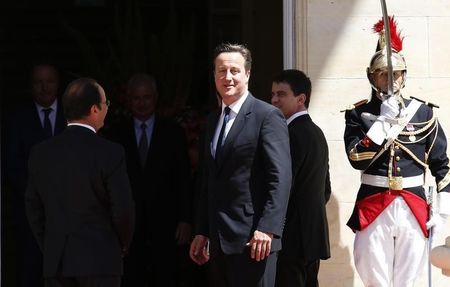LONDON (Reuters) - Prime Minister David Cameron's Conservative party said on Thursday it would resume a stalled drive to make a referendum on Britain's membership of the European Union legally binding, a move designed to woo Eurosceptic voters and unite the party.
Up for re-election next year and under pressure from the anti-EU UK Independence Party, Cameron has promised to try to renegotiate Britain's EU ties if re-elected and to hold a referendum on its membership of the bloc in 2017.
Cameron cannot hold a referendum now because he is in a two-party coalition with the Liberal Democrats, who oppose his plan.
Getting one of his own lawmakers to introduce a bill that makes such a referendum legally binding for whoever is in government after 2015 is therefore the next best thing, even though its chances of success are uncertain.
A Conservative lawmaker on Thursday won the right in a parliamentary ballot to introduce such legislation in a personal capacity before the next election.
"Britain needs a new deal with Europe and the Conservatives have a plan for change in Europe â renegotiate, reform and put the deal to the British people in an in-out referendum by the end of 2017," Bob Neill, member of parliament and Conservative party vice chairman, said in a statement emailed by the party's press office.
"Parliament now has the chance to pass my backbench bill and guarantee that the British people have the final say."
An earlier attempt to get such a bill through parliament failed after the Liberal Democrats and the opposition Labour party refused to back it. It was eventually defeated in the upper house of parliament.
Both parties say they think there should only be an EU referendum if there is a major new transfer of powers to the bloc, something they deem unlikely in the near term.
Cameron's spokesman said on Thursday the prime minister supported the idea of one of his lawmakers re-introducing the failed bill to try to enshrine an EU referendum in law.
"It's importance and salience to him and to his political colleagues hasn't changed," the spokesman said.

Conservative party sources have spoken in the past about the possibility that Cameron could try to force the bill through parliament if it is again rejected by the upper house of parliament.
Even if it is passed, the bill could be repealed by the next government if the Conservatives lose the 2015 election.
(Reporting by Kylie MacLellan; Editing by Andrew Osborn and Raissa Kasolowsky)
